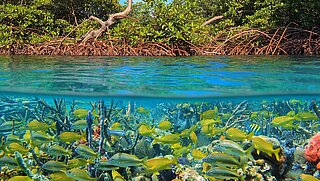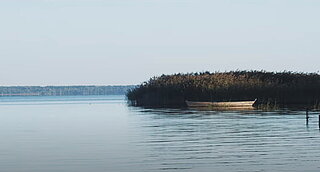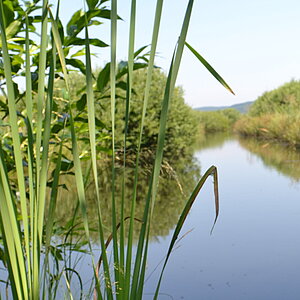Empowerment of Ukrainian Biosphere Reserves

The IKI supports the conservation and restoration of ecosystems in Ukraine in order to strengthen climate change adaptation and regional development in the country.
Ukraine is home to diverse ecosystems that are indispensable for sustaining human livelihoods. Such ecosystems already face multiple threats including unsustainable land use, over-exploitation and, increasingly, also climate change, which are driving stresses on the functionality of the ecosystems and increasing the vulnerability of the communities that depend on them.
This directly affects human well-being and socio-economic situations, as well as ecosystems and the biodiversity of the affected regions. The affected communities are already registering issues such as a decline in agricultural production, a drop in groundwater levels, soil erosion and flooding, or the increased spread of pests.
For example, a few years ago in the Roztochya biosphere reserve in the Lviv region of the Ukraine, no one could understand what was happening to the local environment. Springs and marshes were drying up; the ground water level was decreasing, the river and wells were shallowing, there were increasing numbers of fires, etc. All these changes had a dramatic impact on humans and nature. According to the reserve‘s meteorological station, the average annual air temperature increased by 1.4 °C in the last 10 years and by 1.7° C in the last 5 years. Other regions of Ukraine face similar problems. The reasons for these changes are mainly linked to climate change effects, however anthropogenic pressure on nature is exacerbating the problem.
The project “Ecosystem‐based Adaptation (EbA) to climate change and regional sustainable development by the empowerment of Ukrainian Biosphere Reserves” was launched as part of International Climate Initiative (IKI) in 2018 to address these challenges in Ukraine and to protect or restore ecosystem buffering and regulatory services.
Biosphere reserves as target areas
Three Ukrainian UNESCO biosphere reserves (BR) – Roztochya and West Polesie (Shatskyi) in the west and Desnyanskiy in the northeast of Ukraine – were selected as pilot areas for the implementation of the project.
The main objectives of the project were to enable the population to play an active role in the three target areas, to raise awareness of the consequences of climate change and to build capacities for the implementation of the EbA approach.
Implemented activities and measures
The project achieved all planned results and laid important foundations for the implementation of the EbA approach in Ukraine, thus enhancing the health of ecosystems and biodiversity. Based on the noticeable climate change impacts in the target areas, local knowledge about the relevant links between land use, climate change, ecosystem services and biodiversity was systematically compiled and improved. This resulted in a greater willingness to engage with corresponding EbA-relevant innovations. Becoming familiar with a systemic analysis tool made complex problem contexts clearer, allowing them to be transformed into appropriately complex solution strategies. The EbA work plans of the three partner biosphere reserves for the period 2020-2025 were developed based on the prioritised strategies.
The project cooperated closely with the selected biosphere reserves to conduct baseline studies and develop scientific documentation and maps. It organised citizen and expert workshops and elaborated policy recommendations. A wide range of stakeholders were involved in the process, and new methods of stakeholder participation were tested, reflected upon and implemented in order to achieve lasting benefits for all actors involved.
Ideas competition leads to selection of nine pilot projects
One of the most successful components of the project was the implementation of practical EbA measures, selected within an idea contest. Out of a total of 29 submitted EbA project ideas, the 9 best proposals were selected and implemented on a pilot basis in the three target biosphere reserves, leading to tangible results in ecosystems and biodiversity conservation. This component has generated particular interest among the local population, as well as other Ukrainian biosphere reserves.
Thanks to the comprehensive capacity building measures of the project, but also the practical experience gained during the implementation of the pilot projects, the three target biosphere reserves are now able to accompany the EbA processes and provide advice on the approach within and beyond their territories.
The Roztochya example
Three pilot projects were implemented in Roztochya biosphere reserve. One of them is the Zalyvky Bog Rewetting and Restoration project. Due to the land reclamation conducted from 1960-1980, most of the peat fields in this region were drained and covered by mono-cultural meadows and grasslands. Construction of a dense network of canals also resulted in changes to the surface water runoff and pronounced lowering of the ground water level. The hydrological, hydrochemical, and hydrobiological regime of natural lakes and wetlands, including the Zalyvky bog, were suffering as a result of these changes.
The Zalyvky peat bog has an important regulatory hydrological value for local climate regulation. In order to return the Zalyvky bog to its former balanced ecological status, it was deemed necessary to apply renaturation measures to restore water levels, which had decreased after drainage. Within the project, the bog’s natural state and water regime were restored by blocking reclamation canals and flooding the area. These measures are already showing positive results such as creation of the required fodder base for waterfowl, improved conditions for animal nesting, breeding and migration, return of the indigenous plants and animals and recovery of the ecosystem functionality.
The project will also have an increasing positive impact on the health and well-being of the local inhabitants as well as improving the ecological sustainability and biological productivity of natural ecosystems. As a result of the project, peat fires were stopped and the surface of the swamp is now wet and cool, leading to increased adaptive capacity of the ecosystem to climate change within the biosphere reserve.
This EbA pilot project together with the other eight implemented projects will contribute to the recovery of the ecosystems’ functionality and biodiversity. It is obvious that only healthy ecosystems can support livelihoods and ensure natural resilience to the adverse impacts of climate change.
Conclusion
In conclusion, through comprehensive capacity building, policy work, development of EbA materials and implementation of pilot projects, the project has established a crucial foundation for the further successful implementation of the Ecosystem-based Adaptation approach to climate change and achieved significant positive results, contributing to the overall health of ecosystems and the preservation of biodiversity in Ukraine.
The knowledge and skills acquired by representatives of the partner BRs during this project will be instrumental in effectively implementing adaptation measures within their respective areas of responsibility and expertise, thereby enhancing local ecosystems and the well-being of the dependent communities.
The link has been copied to the clipboard
Contact
IKI Office
Zukunft – Umwelt – Gesellschaft (ZUG) gGmbH
Stresemannstraße 69-71
10963 Berlin
Biodiversity and climate action in the IKI
Ecosystem-based Adaptation approach (EbA)
The EbA approach aims to conserve existing functional ecosystems, reduce human stresses on ecosystems and restore ecological structures and processes in order to increase overall system functionality and health. It is designed to protect human lives, livelihoods, and well-being by conserving and restoring fundamental ecological functions.






